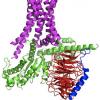It is widely accepted that, when not considering further details, increased IGF-1 and mTOR signalling leads to accelerated ageing. While there are some causative mechanisms explaining this relationship, is this simple association better explained as an axis imbalance? Maybe the problem is not IGF-1 or mTOR signalling inherently, but a lack of counterbalancing signalling.
As we age, GH and IGF-1 decreases leading to decreased life quality due to frailty. Further lowering GH and IGF-1 increases lifespan and burden of disease, and increasing GH and IGF-1 increases life quality but decreases lifespan and burden of disease. Ghrelin signalling decreases as we age, and leptin resistance often increases too.
Maybe we can have our cake and eat it too. I wonder if the missing pieces of the puzzle, if we want the best of both worlds, is that GH and IGF-1 signally only functions healthfully when there is an abundance of ghrelin signalling too?
Ghrelin signalling alone may lead to increased risk of obesity, so then the third piece of the puzzle is to abolish leptin resistance? Recently there was a study showing type-1 diabetics can control their blood sugar with leptin (rather than insulin)... that's a surprising result!
Anti-aging studies need to start taking multivariate approaches - I'd love to see how increased GH/IGF-1 effects lifespan and healthspan when directly induced through ghrelin receptor activity (rather than exogenous GH/IGF-1) alongside leptin-sensitizing and leptin-signalling interventions.
https://www.ncbi.nlm...pubmed/18056963
Ann N Y Acad Sci. 2007 Nov;1119:147-64.
Ghrelin receptor (GHS-R1A) agonists show potential as interventive agents during aging.AbstractAdministration of an orally active agonist (MK-0677) of the growth hormone secretagogue receptor (GHS-R1a) to elderly subjects restored the amplitude of endogenous episodic growth hormone (GH) release to that of young adults. Functional benefits include increased lean mass and bone density and modest improvements in strength. In old mice, a similar agonist partially restored function to the thymus and reduced tumor cell growth and metastasis. Treatment of old mice with the endogenous GHS-R1a agonist ghrelin restored a young liver phenotype. The mechanism involves inhibition of cyclin D3:cdk4/cdk6 activity and increased protein phosphatase-2A (PP2A) activity in liver nuclei, which stabilizes the dephosphorylated form of the transcription factor C/EBPalpha preventing the age-dependent formation of the C/EBPalpha-Rb-E2F4-Brm nuclear complex. By inhibiting formation of this complex, repression of E2F target genes is de-repressed and C/EBPalpha regulated expression of Pepck, a regulator of gluconeogenesis, is normalized, thereby restoring a young liver phenotype. In the brain, aging is associated with decline in dopamine function. We investigated the potential neuromodulatory role of GHS-R1a on dopamine action. Neurons were identified in the hippocampus, cortex, substantia nigra, and ventral tegmental areas that coexpressed GHS-R1a and dopamine receptor subtype-1 (D1R). Cell culture studies showed that, in the presence of ghrelin and dopamine, GHS-R and D1R form heterodimers, which modified G-protein signal transduction resulting in amplification of dopamine signaling. We speculate that aging is associated with deficient endogenous ghrelin signaling that can be rescued by intervention with GHS-R1a agonists to improve quality of life and maintain independence.
https://www.ncbi.nlm...pubmed/26830139
Mol Psychiatry. 2016 Nov;21(11):1613-1623. doi: 10.1038/mp.2015.220. Epub 2016 Feb 2.
Increased ghrelin signaling prolongs survival in mouse models of human aging through activation of sirtuin1.Fujitsuka N1,2, Asakawa A1, Morinaga A1, Amitani MS1, Amitani H1, Katsuura G1, Sawada Y3, Sudo Y3, Uezono Y3, Mochiki E4, Sakata I5, Sakai T5, Hanazaki K6, Yada T7, Yakabi K8, Sakuma E9, Ueki T9, Niijima A10, Nakagawa K11, Okubo N11, Takeda H11,12, Asaka M13, Inui A1.AbstractCaloric restriction (CR) is known to retard aging and delay functional decline as well as the onset of diseases in most organisms. Ghrelin is secreted from the stomach in response to CR and regulates energy metabolism. We hypothesized that in CR ghrelin has a role in protecting aging-related diseases. We examined the physiological mechanisms underlying the ghrelin system during the aging process in three mouse strains with different genetic and biochemical backgrounds as animal models of accelerated or normal human aging. The elevated plasma ghrelin concentration was observed in both klotho-deficient and senescence-accelerated mouse prone/8 (SAMP8) mice. Ghrelin treatment failed to stimulate appetite and prolong survival in klotho-deficient mice, suggesting the existence of ghrelin resistance in the process of aging. However, ghrelin antagonist hastened death and ghrelin signaling potentiators rikkunshito and atractylodin ameliorated several age-related diseases with decreased microglial activation in the brain and prolonged survival in klotho-deficient, SAMP8 and aged ICR mice. In vitro experiments, the elevated sirtuin1 (SIRT1) activity and protein expression through the cAMP-CREB pathway was observed after ghrelin and ghrelin potentiator treatment in ghrelin receptor 1a-expressing cells and human umbilical vein endothelial cells. Furthermore, rikkunshito increased hypothalamic SIRT1 activity and SIRT1 protein expression of the heart in the all three mouse models of aging. Pericarditis, myocardial calcification and atrophy of myocardial and muscle fiber were improved by treatment with rikkunshito. Ghrelin signaling may represent one of the mechanisms activated by CR, and potentiating ghrelin signaling may be useful to extend health and lifespan.















































